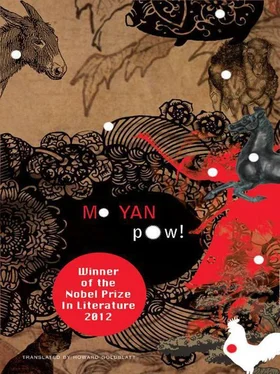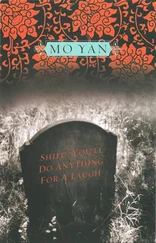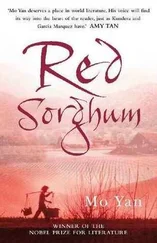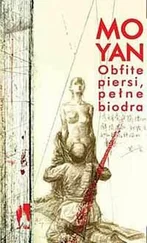‘No.’
‘All right, then, if you won't do it, I'll do it myself—slowly.’ He turned the butcher knife on himself and sliced a deep gash in his belly, which immediately began to ooze yellow fat and then blood.
Jiaojiao threw up at the sight.
‘Are you going to kill me or aren't you?’
‘No.’
He stabbed himself a second time.
We turned and ran but he followed us relentlessly. Knife raised high and blood streaming from his belly, he came after us, shouting over and over: ‘Kill me—kill me—Luo Xiaotong, Luo Jiaojiao, do a good deed by killing me—’
The next morning, we'd barely shown up at the Huachang gate when he ran up on his stubby legs, knife in hand, and opened his shirt to show us his wounds. ‘Kill me—kill me—Luo Xiaotong, Luo Jiaojiao, kill me—’
We ran off, but even from far away we could hear his cries.
Back home, before we even caught our breath, a man in dark glasses rode up on a motorcycle with a green sidecar and stopped at our gate. Wan Xiaojiang climbed out of the sidecar and staggered into our yard, still holding his knife, still showing us his wounds, still shouting: ‘Kill me—kill me—’
We slammed the door shut; shouting, he attacked it with his substantial buttocks. His voice, which cut like a knife, sounded like it could slice through glass. We covered our ears with our hands but to no avail. The door was starting to give way, the hinges pulling free. A moment later it fell apart with a crash and the splintering of glass. Wan burst into the room: ‘Kill me—kill me—’
Jiaojiao and I slipped under his armpits and ran as fast as we could. But when we reached the street the motorcycle was following us, as were Wan Xiaojiang's shouts.
We ran out of the village and into the overgrown fields, but the rider—the man must have been a motorcross racer—rode straight into the waist-high grass and across the water-filled ditches, startling clusters of strange-looking hybrid animals out of their dens. As for Wan Xiaojiang, his unnerving shouts never stopped swirling round us.
That's what did it, Wise Monk. We left home and began living a rootless life, all to get away from that rotten Wan Xiaojiang. Three months later, we returned, and the minute we walked in the door of our home we discovered that we'd been cleaned out by thieves. No TV, no VCR, the cabinets thrown open, the drawers pulled out, even the pot was gone. All that was left were two stovetop frames, like a pair of ugly, toothless, gaping mouths. Fortunately, my mortar still rested in a side room under its dusty cover.
We sat in the doorway and watched the people on the street, both of us sobbing, high one moment, low the next. The neighbours brought jars, baskets, even plastic bags, all filled with meat, fragrant, lovely meat, and laid them at our feet. No one said a word. They just watched us, and we knew they wanted us to eat the meat they'd brought. All right, kind people, we'll eat it, we will.
We ate it.
Ate it.
Ate.
We ate so much we couldn't stand; we looked down at our bulging bellies and then crawled inside on our hands and knees. Jiaojiao said she was thirsty. So was I. But there was no water in the house. We looked round till we found a bucket under the eaves, half filled with foul water, perhaps rainwater from that autumn. Dead insects floated on the surface but we drank it anyway.
Yes, that's how it was, Wise Monk.
When the sun came up, my sister was dead.
At first I didn't realize it. I heard the meat screaming in her stomach and saw that her face had turned blue. Then I saw the lice crawling out of her hair and I knew she was dead. ‘Baby sister,’ I cried out, but I'd barely got the words out when chunks of undigested meat spilt from my mouth.
I vomited, my stomach feeling like a filthy toilet and the putrid smell of rotting food filling in my mouth. It was the meat, hurling filthy curses at me. Chunks of meat thrown up from my stomach began to crawl like toads…I was disgusted and filled with loathing. At that moment, Wise Monk, I vowed to never eat meat. I'd rather eat dirt from the road than a single bite of meat, I'd rather eat horse manure in a stable than a single bit of meat, I'd rather starve to death than a single bite of meat…
It took me several days to clear my stomach of meat. I crawled down to the river and drank mouthfuls of clean water with bits of ice in it; I ate a sweet potato someone had thrown onto the riverbank. Slowly my strength returned.
One day child came running up to me. ‘Luo Xiaotong. You're Luo Xiaotong, aren't you?’
‘Yes, but how did you know?’
‘I just know,’ he said. ‘Come with me. Someone is looking for you.’
I followed him into a two-room hut in a peach grove, where I saw the old couple who had sold us the beat-up mortar years earlier. The mule, now aged a great deal, was there too, standing alone beneath a peach tree eating dry leaves.
‘Grandpa, Grandma…’ I threw myself into the old woman's arms as if she really were my grandmother and wet her clothes with my tears. ‘I've lost everything,’ I sobbed. ‘I've got nothing. Mother's dead, Father's arrested, my sister's dead and I can't bear to eat meat any more…’
The old man pulled me out of her arms and smiled. ‘Look over there, son.’
There in the corner of the hut stood seven wooden cases. On them were printed words that were as unfamiliar to me as I was to them.
The old man opened one of the cases with a crowbar and peeled back a sheet of oiled paper to reveal six long, tenpin-shaped objects with wing-like fins. My god—mortar shells—I'd dreamt of possessing them—mortar shells!
He carefully removed one. ‘Each case holds six of these, except this last one, which is missing a shell. A total of forty-one. I tested one before you arrived. I tied a rope to one of the wings and threw it over a cliff. It blew up just the way it was supposed to. The explosion echoed through the mountains, frightening the wolves out of their dens.’
I gazed down at the shells and at their strange lustre in the moonlight. Then I looked into the old man's eyes, glowing like burning coal. I felt my weakness vanish and the rise of a magnificent heroic spirit.
‘Lao Lan,’ I said, clenching my jaw, ‘your day of reckoning has arrived!’
The production of the opera From Meat Boy to Meat God nears its finale. The dutiful meat boy is kneeling on the stage, slicing flesh from his arm to brew for his ailing mother. She recovers but, owing to a prolonged state of exhaustion, starvation and loss of blood, he dies. In the last scene, a surreal dreamlike sequence, the mother reveals through her tears how she misses her son and grieves over his death. Then the meat boy, splendidly attired and wearing a golden headdress, appears, as if descended from a cloud of mist. His mother holds her head and sobs when they meet, but the meat boy consoles her with the news that the Celestial Ruler, moved by his dutiful act, has anointed him a Meat God whose domain is the world of meat-eaters. The opera appears to have ended happily but it has done nothing to dispel my feelings of desolation. The mother, still weeping, sings an aria : ‘ Better to feed my son weak tea and simple food on earth than see him as a Meat God in a heavenly berth …’ The mist fades and the opera is over. The performers return for their curtain call ( there is, of course, no curtain ), and are greeted by sporadic applause. Troupe Leader Jiang rushes onstage to announce : ‘ Ladies and Gentlemen, tomorrow's performance will be Slaying the Wutong Spirit. Don't miss it .’ The crowd chatters noisily as it disperses. Now the food-vendors make their final attempts at a sale . ‘ My daughter ,’ Lao Lan says to Tiangua , ‘ you can spend the night with us. Your aunt and I have made up the best room for you .’ An uncomfortable Fan Zhaoxia says : ‘ Yes, come home .’ Tiangua looks at Fan with loathing but says nothing. She walks up to a lamb-vendor . ‘ Give me ten kebabs and add plenty of cumin .’ Happy to oblige, the vendor takes out a handful of kebabs from a filthy plastic bag and lays them atop a charcoal brazier. He squints to keep the smoke from his eyes and makes a puffing sound with his mouth, as if to clear it of dust. Now that the crowd and the actors have dispersed, Lan Daguan mounts the stage, followed by a foreigner in gold-rimmed glasses. He strips naked to show off his erect penis . ‘ Tell me if I was boasting !’ he says angrily to the foreigner . ‘ Take a good look and tell me .’ The foreigner claps his hands and six blonde, blue-eyed naked women go up on the stage and lie in a row. Lan Daguan takes them one at a time, drawing yelps of pleasure all the way down the line. Six more women go up on stage. Then six more. And six more. And six more. And six more. And five more. Forty-one women in all. I keep my eyes on the tireless Lan Daguan as the combat rages on and watch as he, as if on cue, transforms into a horse. He whinnies loudly, showing off his powerful muscles and his strong limbs. Truly a noble stallion radiating vitality. A magnificent head, its perfect, pointed ears like cut bamboo. Bright, shining eyes. A small mouth below a large snout. A graceful neck lifted high between broad shoulders. A smooth rump, a tail raised captivatingly. A rounded torso encasing resilient ribs. Four slender, graceful legs with bright hooves that shine with a light-blue glow. He gives a rousing performance on the stage, moving from a trot to a gallop, dancing one moment and leaping the next, displaying every dazzling movement possible, demanding acclaim as the acme of perfection. Then comes the finale: Lan Daguan rises from atop the forty-first woman, seemingly coated with a layer of greasepaint, points at the foreigner with a single finger and says : ‘ You lose .’ The man draws a fancy revolver and aims it at the horse's genitals . ‘ I don't ,’ he says and pulls the trigger. Lan Daguan thuds to the ground, like a toppled wall. At that same moment, I hear a loud crash and look to see the Horse Spirit crumble to the floor, now a mere pile of clay. And then the lights go out. It's the middle of the night and I can't see a soul. I remove my dark glasses and am treated to a resplendent night sky, with strange white figures a-dance on the stage. Bats fly in and out, birds in the trees flap their wings, the temple grounds are alive with the chirp of insects. Let me hurry and finish my tale, Wise Monk —
Читать дальше












